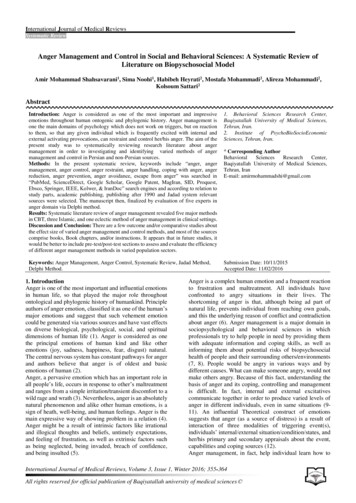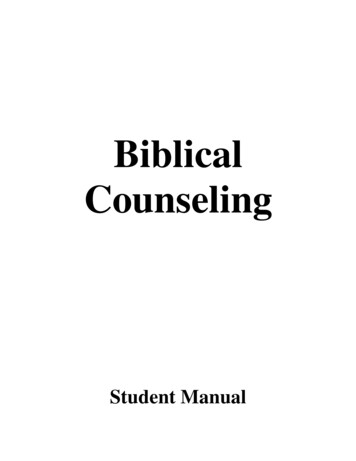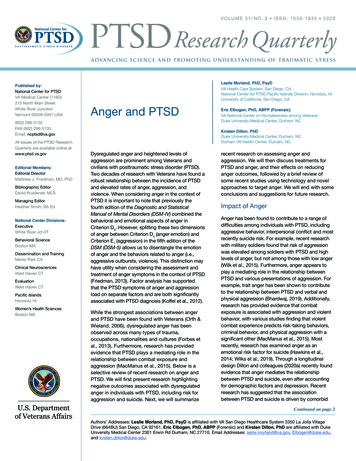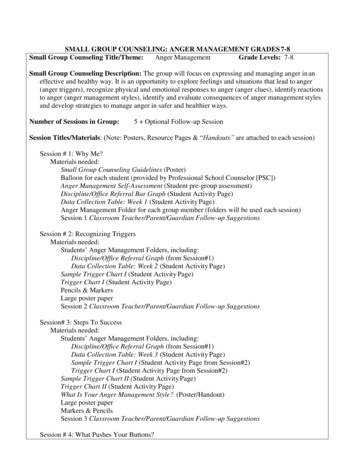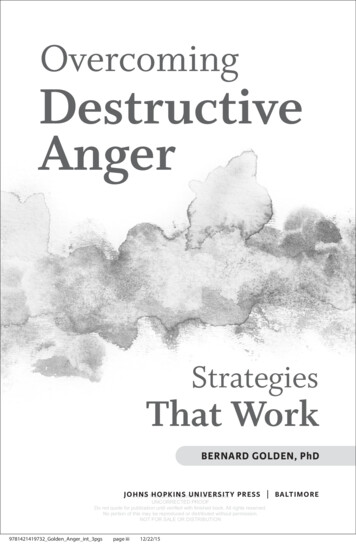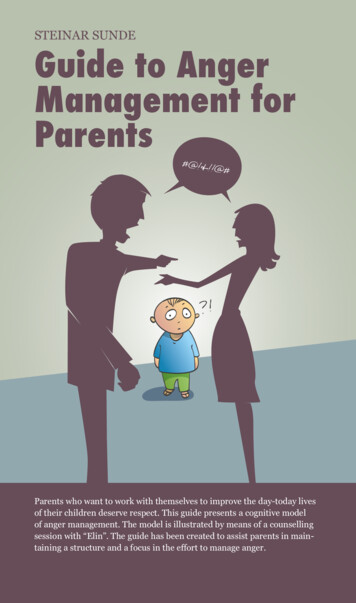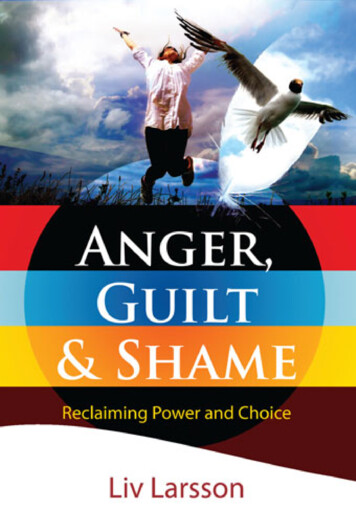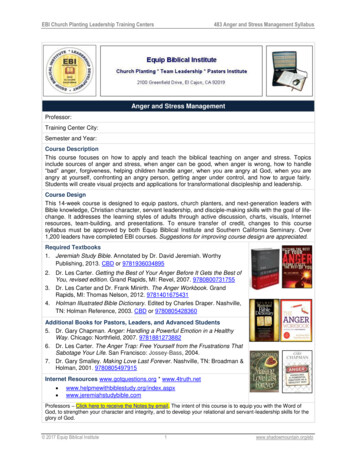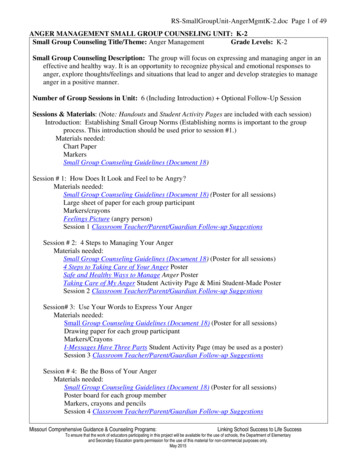
Transcription
RS-SmallGroupUnit-AngerMgmtK-2.doc Page 1 of 49ANGER MANAGEMENT SMALL GROUP COUNSELING UNIT: K-2Small Group Counseling Title/Theme: Anger ManagementGrade Levels: K-2Small Group Counseling Description: The group will focus on expressing and managing anger in aneffective and healthy way. It is an opportunity to recognize physical and emotional responses toanger, explore thoughts/feelings and situations that lead to anger and develop strategies to manageanger in a positive manner.Number of Group Sessions in Unit: 6 (Including Introduction) Optional Follow-Up SessionSessions & Materials: (Note: Handouts and Student Activity Pages are included with each session)Introduction: Establishing Small Group Norms (Establishing norms is important to the groupprocess. This introduction should be used prior to session #1.)Materials needed:Chart PaperMarkersSmall Group Counseling Guidelines (Document 18)Session # 1: How Does It Look and Feel to be Angry?Materials needed:Small Group Counseling Guidelines (Document 18) (Poster for all sessions)Large sheet of paper for each group participantMarkers/crayonsFeelings Picture (angry person)Session 1 Classroom Teacher/Parent/Guardian Follow-up SuggestionsSession # 2: 4 Steps to Managing Your AngerMaterials needed:Small Group Counseling Guidelines (Document 18) (Poster for all sessions)4 Steps to Taking Care of Your Anger PosterSafe and Healthy Ways to Manage Anger PosterTaking Care of My Anger Student Activity Page & Mini Student-Made PosterSession 2 Classroom Teacher/Parent/Guardian Follow-up SuggestionsSession# 3: Use Your Words to Express Your AngerMaterials needed:Small Group Counseling Guidelines (Document 18) (Poster for all sessions)Drawing paper for each group participantMarkers/CrayonsI-Messages Have Three Parts Student Activity Page (may be used as a poster)Session 3 Classroom Teacher/Parent/Guardian Follow-up SuggestionsSession # 4: Be the Boss of Your AngerMaterials needed:Small Group Counseling Guidelines (Document 18) (Poster for all sessions)Poster board for each group memberMarkers, crayons and pencilsSession 4 Classroom Teacher/Parent/Guardian Follow-up SuggestionsMissouri Comprehensive Guidance & Counseling Programs:Linking School Success to Life SuccessTo ensure that the work of educators participating in this project will be available for the use of schools, the Department of Elementaryand Secondary Education grants permission for the use of this material for non-commercial purposes only.May 2015
RS-SmallGroupUnit-AngerMgmtK-2.doc Page 2 of 49Session # 5: Closure: Circle of Friends Calm, Cool, and CollectedMaterials needed:Small Group Counseling Guidelines (Document 18) (Poster for all sessions)Group Certificate of CompletionHow Do You Think These People Are Feeling? (picture of happy children)Materials and items to celebrate the ending of the group (see Session 4)Session 5 Classroom Teacher/Parent/Guardian Follow-up SuggestionsStudent Post-Group Perceptions Form (Document 16)Unit Assessments (attached to the Unit Plan)Teacher Pre/Post-Group Perception Form (Document 14) (2 Samples)Parent/Guardian Post-Group Perception Form (Document 15)Group Summary Form (Document 17)Optional Follow-up Session (to be held 4 to 6 weeks after last group session)Materials needed:Small Group Counseling Guidelines (Document 18) (Poster for all sessions)8 ½ x 11 piece of paper and markers for each studentAlternative Procedure: Complete the Student Post-Group Perceptions Form (Document 16)or Student Post-Group Follow-Up Interview Form (Document 13)Missouri Comprehensive Guidance and Counseling Content Area Strand/Big Idea(s):Personal and Social Development: PS.3 Applying Personal Safety Skills and Coping StrategiesMissouri Comprehensive Guidance and Counseling Concept(s):PS.3.A. Safe and Healthy ChoicesPS.3.B. Personal Safety of Self and OthersPS.3.C. Coping SkillsAmerican School Counselor Association (ASCA)National Standard:Personal/Social DevelopmentA. Students will acquire the knowledge, attitudes and interpersonal skills to help them understandand respect self and others.Show-Me Standards: Performance Goals (check one or more that apply)Goal 1: gather, analyze and apply information and ideasGoal 2: communicate effectively within and beyond the classroomXGoal 3: recognize and solve problemsXGoal 4: make decisions and act as responsible members of societyXOutcome Summative Assessment: acceptable evidence of student achievementSummative assessment relates to the performance outcome for goals, objectives and (GLE)concepts. Assessment can be survey, student sharing, etc.Summative Assessment of Student Achievement:The students will identify via role play how anger affects each of them physically and emotionally.The students will generate group and individual lists of positive anger management strategies anddemonstrate the three strategies that work best for them individually.Perceptual Data Collection:Missouri Comprehensive Guidance & Counseling Programs:Linking School Success to Life SuccessTo ensure that the work of educators participating in this project will be available for the use of schools, the Department of Elementaryand Secondary Education grants permission for the use of this material for non-commercial purposes only.May 2015
RS-SmallGroupUnit-AngerMgmtK-2.doc Page 3 of 49The following end-of-group perceptual data collection forms will be used as a part of Sessions 4 & 5;the forms are attached to the Unit Plan:Classroom Teacher Assessment: The classroom teacher will complete the Teacher Pre/Post-Group Perception Form (Document14) for each student before the group starts and after the group ends. Counselor may considermaking two copies of this form, one for the pre-assessment and one for the post-assessment,then entering all data on a final form for comparison. Teacher Pre/Post-Group Perception Form (Document 14) (2 Samples) (teacher completes at theend of the group).Parent/Guardian Assessment: Parent/Guardian Post-Group Perception Form (Document 15) parents/guardians complete andreturn form with students.)Student Assessment: Student Post-Group Perception Form (Document 16) (students complete during Session 5)Results Based Data Collection:The counselor will demonstrate the effectiveness of the unit via pre- and post-comparisons of suchfactors as attendance, grades, discipline reports and other information, utilizing the PRoBE Model(Partnerships in Results Based Evaluation). For more information about PRoBE, contact the Guidanceand Placement section at the Missouri Department of Elementary and Secondary Education.Follow-Up Ideas & Activities (all sessions)Implemented by counselor, administrators, teachers, parents/guardians, community partnershipsAfter each session, the PSC will provide classroom teacher(s) and parents/guardians a written summaryof the skills taught during the session. The summary will include suggestions for classroom and/or homereinforcement of the skills.Missouri Comprehensive Guidance & Counseling Programs:Linking School Success to Life SuccessTo ensure that the work of educators participating in this project will be available for the use of schools, the Department of Elementaryand Secondary Education grants permission for the use of this material for non-commercial purposes only.May 2015
RS-SmallGroupUnit-AngerMgmtK-2.doc Page 4 of 49DOCUMENT 13:STUDENT POST-GROUP FOLLOW-UP INTERVIEW FORMNote: This document serves as an example of a way to follow students’ success in maintaining changes. It may also beused as a means for gathering data about students’ perceptions of the effectiveness of the group. Students who participatein follow-up sessions after a group ends are more likely to maintain the gains made. The Professional School Counselor(PSC) should make arrangements to talk with group members individually and hold at least one more group session 4-6weeks after the group has ended. The follow-up session will enable the PSC to assess how students are doing on their goalsand the successes they are experiencing as a result of the group. Follow-up sessions provide data that will demonstrate theproven effectiveness of small group counseling.Follow-up Interviews/Session with StudentsPotential Interview Questions:How are things going?What specific skills are you practicing now that the group is over?What was the most useful thing you learned from the group?What skills would you like to practice?How are things different for you now?What is better?What is in need of improvement?What progress have you made toward the goals you set for yourself at the end of our groupmeetings?How are you keeping yourself accountable?What suggestions do you have for future groups?Rank your overall experience on a scale from5 1:5 Most positive activity in which I have participated for a long time4 Gave me a lot of direction with my needs3 I learned a lot about myself and am ready to make definite changes2 I did not get as much as I had hoped out of the group1 The group was a waste of my timeWhat contributed to the ranking you gave your experience in the group? What could have madeit better?Missouri Comprehensive Guidance & Counseling Programs:Linking School Success to Life SuccessTo ensure that the work of educators participating in this project will be available for the use of schools, the Department of Elementaryand Secondary Education grants permission for the use of this material for non-commercial purposes only.May 2015
RS-SmallGroupUnit-AngerMgmtK-2.doc Page 5 of 49DOCUMENT 14:TEACHER PRE/POST-GROUP PERCEPTION FORM(SAMPLE 1 OF 2)Note: Samples 1 & 2 of Document 14 provide you with examples of two ways to gather data about teachers’ post-groupperceptions of the effectiveness of the group. Sample 1 measures teachers’ perceptions of the changes the student made as aresult of the group experience. Sample 2 measures the teacher’s perceptions of the counseling group as a whole. An advantageto using form 2 is that it parallels Document 15: Parent/Guardian Post-Group Feedback Form and Document 16: Student PostGroup Perception Form; thus, making it possible to compare teacher, parent and student perceptions of the group experience.10H1HNote: The classroom teacher completes Part 1 of this document before students begin group sessions andcompletes Part 2 after the group has been completed. This process will provide the school counselor with follow upfeedback about individual students who participated in the group.Sample 1: Individual Student Behavior Rating Form(Adapted from Columbia Public Schools’ Student Behavior Rating Form)STUDENT GRADE TEACHERDATE: Pre-Group Assessment Date: Post-Group AssessmentPart 1 - Please indicate rating of pre-group areas ofconcern in the left hand column.Part 2 - Please indicate rating of post-group areas ofconcern in the right hand column.Pre-Group ConcernsStudent Work Habits/Personal Goals ObservedColleagues, please help evaluate the counselingRank on a scale of 5 1(5 Extreme 3 Moderate group in which this student participated. Your opinionis extremely important as we strive to continuously1 None)improve our effectiveness with ALL students.54321Post-Group ConcernsRank on a scale of 5 1(5 Extreme 3 Moderate 1 None)543Academic DevelopmentFollows directionsListens attentivelyStays on taskCompliance with teacher requestsFollows rulesManages personal & school property (e.g., organized)Works neatly and carefullyParticipates in discussion and activitiesCompletes and returns homeworkPersonal and Social DevelopmentCooperates with othersShows respect for othersAllows others to work undisturbedAccepts responsibility for own misbehavior (e.g., provokingfights, bullying, fighting, defiant, anger, stealing)Emotional Issues (e.g., perfectionism, anxiety, anger,depression, suicide, aggression, withdrawn, low selfesteem)Career DevelopmentAwareness of the World of WorkSelf-AppraisalDecision MakingGoal SettingAdd Other Concerns:Missouri Comprehensive Guidance & Counseling Programs:Linking School Success to Life SuccessTo ensure that the work of educators participating in this project will be available for the use of schools, the Department of Elementaryand Secondary Education grants permission for the use of this material for non-commercial purposes only.May 201521
RS-SmallGroupUnit-AngerMgmtK-2.doc Page 6 of 49DOCUMENT 14:TEACHER PRE/POST-GROUP PERCEPTIONSNote: This document measures the teacher’s perceptions of the effectiveness of the group as a whole. Theteacher could complete this form after the last group session has been completed.(SAMPLE 2 OF 2)TEACHER PRE/POST-GROUP PERCEPTIONS FORMOne or more of your students participated in a small counseling group about . We areseeking your opinion about the effectiveness of the group e.g., students’ relationship with theprofessional school counselor and other participants in the group and your observations of students’behavioral/skill changes (positive or negative). We appreciate your willingness to help us meet the needsof all students effectively. The survey is anonymous unless you want us to contact you.Teacher’s Name (optional): Date:Professional School Counselor’s Name:Small Group Title:Before the group started, I hoped students would learn:While students were participating in the group I noticed these changes in their behavior/attitudeUsing a scale of 5 to 1 (5 strongly agree and 1 strongly disagree), please circle your opinionabout the followingWhat do you think?5 Strongly Agree3 Neutral1 Strongly DisagreeOverall, I would rate my students’ experience in the counselinggroup as positive.Students enjoyed working with other students in the group.5432154321Students enjoyed working with the counselor in the group.54321Students learned new skills and are using the skills in school54321I would recommend the group experience for other students.54321Additional Comments for Counselor:Missouri Comprehensive Guidance & Counseling Programs:Linking School Success to Life SuccessTo ensure that the work of educators participating in this project will be available for the use of schools, the Department of Elementaryand Secondary Education grants permission for the use of this material for non-commercial purposes only.May 2015
RS-SmallGroupUnit-AngerMgmtK-2.doc Page 7 of 49DOCUMENT 15:PARENT/GUARDIAN POST-GROUP PERCEPTION FORMNote: This cover letter and parent feedback form may be sent home with students after the last group session.Parent/Guardian Feedback FormYour student participated in a small counseling group about . Was this group experiencehelpful for your student? Following is a survey about your observations of changes (positive or negative)your student made at home while participating in the group at school and since the group ended. Thesurvey will help us meet the needs of all students more effectively. The survey is anonymous unless youwant to provide your name for the school counselor to contact you. We appreciate your feedback.Professional School Counselor: Date:Small Group Title:Before the group started, I hoped my student would learnI’ve noticed these changes in my student’s behavior and/or attitude as a result of participating in thegroup:Using a scale of 5 to 1 (5 strongly agree and 1 strongly disagree), please circle your opinionabout the following:What do you think?5 Strongly Agree3 Neutral1 Strongly DisagreeOverall, I would rate my student’s experience in thecounseling group as positiveMy student enjoyed working with the other students inthe group.My student enjoyed working with the counselor in thegroup.My student learned new skills and is using the skills inand out of school.I would recommend the group experience to otherparents whose students might benefit from the smallgroup.Additional Comments:Missouri Comprehensive Guidance & Counseling Programs:5432154321543215432154321Linking School Success to Life SuccessTo ensure that the work of educators participating in this project will be available for the use of schools, the Department of Elementaryand Secondary Education grants permission for the use of this material for non-commercial purposes only.May 2015
RS-SmallGroupUnit-AngerMgmtK-2.doc Page 8 of 49DOCUMENT 16:STUDENT POST-GROUP PERCEPTIONS(Sample 2 of 2)Note: This feedback form may be sent home with group members after the last group session. This formmeasures the group member’s perceptions of the overall effectiveness of the group using the samequestions as teachers and parents answer on their feedback forms. Group members complete during thelast session (or the follow-up session if you have one). This is the elementary level form.STUDENT FEEDBACK FORMDirections: Please complete the Student Feedback Form after the last group session.Name: (optional) Date:When I started the group, I wanted to learn about .Topic of GroupInstructions: Read each sentence. Put a circle around the face that shows how you think andfeel right now about what you learned in the group. I agree I’m not sure I disagree1. Overall, I would rate my experience in the counseling group as: I agree I’m not sure I disagree2. I enjoyed working with other students in the group I agree I’m not sure I disagree3. I enjoyed working with the counselor in the group. I agree I’m not sure I disagree4. I learned new skills and am using the skills in school. I agree I’m not sure I disagree5. If other students ask me if they should participate in a similar group, I would recommend that they giveit a try I agree I’m not sure I disagreeAdditional comments you would like to share with the counselor:Missouri Comprehensive Guidance & Counseling Programs:Linking School Success to Life SuccessTo ensure that the work of educators participating in this project will be available for the use of schools, the Department of Elementaryand Secondary Education grants permission for the use of this material for non-commercial purposes only.May 2015
RS-SmallGroupUnit-AngerMgmtK-2.doc Page 9 of 49DOCUMENT 17:GROUP SUMMARY FORMNote: This letter may be sent home with students after the last group session.(Print on SCHOOL LETTERHEAD)Comprehensive Guidance and Counseling ProgramSmall Group Counseling topic/title:Student’s Name Teacher’s NameDate:5BDear ,I have enjoyed getting to know your student in our small group counseling sessions. This weekwas the last session for our group. During the group sessions we shared information related to avariety of topics. Below is a list of topics discussed during the group sessions.Session 1:Session 2:Session 3:Session 4:Session 5:Session 6:Comments from the school counselor about your student’s progress:Thank you for your support. Please contact me if you have questions or concerns.Sincerely,Professional School CounselorMissouri Comprehensive Guidance & Counseling Programs:Linking School Success to Life SuccessTo ensure that the work of educators participating in this project will be available for the use of schools, the Department of Elementaryand Secondary Education grants permission for the use of this material for non-commercial purposes only.May 2015
RS-SmallGroupUnit-AngerMgmtK-2.doc Page 10 of 49DOCUMENT 18:Small Group Counseling Guidelines PosterNote: This list may be used as best meets the students’ age/grade level. It could be posted in the room, handedout to the students, or turned in to a worksheet with space for each group to add their own guidelines.Small Group Counseling Guidelines1.All participants observe confidentiality.a. Counselorb. Student2.Everyone will be an active listener.3.Everyone has an opportunity to participate andshare.4.Use positive language.5.All participants will treat each other withrespect.Missouri Comprehensive Guidance & Counseling Programs:Linking School Success to Life SuccessTo ensure that the work of educators participating in this project will be available for the use of schools, the Department of Elementaryand Secondary Education grants permission for the use of this material for non-commercial purposes only.May 2015
RS-SmallGroupUnit-AngerMgmtK-2.doc Page 11 of 49Group Title: IntroductionThis is a sample introduction session for establishing small group norms.Session Title: Establishing Small Group NormsSession # 1 of 1Grade Level: K-12Estimated time: 30 minutesSmall Group Counseling Session Purpose: To establish small group counseling guidelines, to discussthe purpose of the group, and to begin student self-evaluation process.Missouri Comprehensive Guidance and Counseling Content Area Strand/Big Idea(s):Personal and Social Development: PS.3 Applying Personal Safety Skills and Coping StrategiesMissouri Comprehensive Guidance and Counseling Concept(s):PS.3.A. Safe and Healthy ChoicesPS.3.B. Personal Safety of Self and OthersPS.3.C. Coping SkillsAmerican School Counselor Association (ASCA)National Standard:Personal/Social DevelopmentA. Students will acquire the knowledge, attitudes and interpersonal skills to help them understandand respect self and others.NOTE: The overall purpose of the MCGCP small group counseling units and sessions is to give extra support to students who need helpmeeting specific Comprehensive Guidance and Counseling Program Grade Level Expectations (GLEs). This small group counseling unitprovides a “template” that allows you to personalize sessions to meet the unique needs of your students. Your knowledge of thedevelopmental levels, background and experiences of your students determine the depth and level of personal exploration required to makethe sessions beneficial for your students.INTRODUCTION Materials (include activity sheets and/ or supporting resources)Chart paperMarkersSmall Group Counseling Guidelines (Document 18)INTRODUCTION Formative AssessmentShare small group counseling guidelines and monitor personal behavior within the group, such as:waiting to speak, listening to what others have to say, and responding to others’ statements withoutputting them down.INTRODUCTION Session PreparationEssential Questions: How do people communicate their ideas in a group? How do people treat eachother in a group?Engagement (Hook): What groups do you belong to? What groups would you like to belong to?Missouri Comprehensive Guidance & Counseling Programs:Linking School Success to Life SuccessTo ensure that the work of educators participating in this project will be available for the use of schools, the Department of Elementaryand Secondary Education grants permission for the use of this material for non-commercial purposes only.May 2015
RS-SmallGroupUnit-AngerMgmtK-2.doc Page 12 of 49INTRODUCTION ProceduresProfessional School Counselor Procedures:IntroductionStudent Involvement: Introduction1. “Today, we are going to talk about working within 1. Students discuss the guidelines and offergroups and how small group counseling guidelinestheir definitions of each guideline. Thehelp members as they work together.” Introducestudents decide upon any other groupthe Small Group Counseling Guidelines (Documentguidelines they would like to add. Asguidelines are accepted, students discuss18). Students may wish to add additionalhow they will be expected to follow them.guidelines suitable for their specific group.When discussing the term, confidentiality, relate it tooutside-the-group talk versus inside-the-group talk.The members may talk with someone outside thegroup about something they may have said, butthey cannot talk about who the members of thegroup are, or what others shared. Acknowledgestudent suggestions as examples of howconfidentiality can be maintained.Students make suggestions for maintainingconfidentiality.Post Small Group Counseling Guidelines (Document18), including any additional guidelines the groupdevelops, for the group to refer to during eachgroup session. Remind students that they will beexpected to follow the guidelines during eachsession.2. Introduce the icebreaker activity: Review thegroups that were discussed during the hook. “Whatwere some the positive things that made you feelgood when you were with that group? Or, if youdidn’t enjoy the group, what would have made theexperience better for you?”NOTE: This activity can be done in a number of ways: Students may work in a Think-Pair-Share inwhich they are placed into pairs to discuss theprompts and come up with ideas together. Students may work with a large piece of chartpaper or bulletin board paper to come up withideas in graffiti form which is presented for finalgroup approval. Solicit information from the entire group forconsideration, which is then to be written onchart paper and edited through group approval.3. Discuss the purpose of the group. Ask what thestudents would like to learn or achieve in the nextMissouri Comprehensive Guidance & Counseling Programs:2. Students develop a list of experiences;either individually, with another student, orwith the group. Possible student commentsmight be: We treat others as we would like to betreated. Everyone gets a turn. Nobody gets left out. No put-downs. Take turns when speaking. Everyone has a chance to share. Listen when others are speaking. Put away equipment when you arefinished. Respect each other’s differences.3. Students share ideas about what they wouldlike to learn or achieve.Linking School Success to Life SuccessTo ensure that the work of educators participating in this project will be available for the use of schools, the Department of Elementaryand Secondary Education grants permission for the use of this material for non-commercial purposes only.May 2015
RS-SmallGroupUnit-AngerMgmtK-2.doc Page 13 of 49Professional School Counselor Procedures:IntroductionStudent Involvement: Introductionfew weeks in the group. Record student responsesfor future reference.Closure/Summary: Review the small group counselingguidelines with the students. Give students time anddate of the next session.Closure/Summary: Students review the smallgroup counseling guidelines and note the dateand time of the next session.INTRODUCTION Follow-Up Activities (Optional)INTRODUCTION Counselor Reflection Notes (completed after the session)STUDENT LEARNING: How will students’ lives be better as a result of what happened during this session?SELF EVALUATION: How did I do?IMPLEMENTATION PROCEDURES: How did the session work?Missouri Comprehensive Guidance & Counseling Programs:Linking School Success to Life SuccessTo ensure that the work of educators participating in this project will be available for the use of schools, the Department of Elementaryand Secondary Education grants permission for the use of this material for non-commercial purposes only.May 2015
RS-SmallGroupUnit-AngerMgmtK-2.doc Page 14 of 49Small Group Counseling Guidelines1. All participants will observe confidentiality.a. Counselorb. Student2. Everyone will be an active listener.3. Everyone has an opportunity to participate andshare.4. Everyone will use positive language.5. All participants will treat each other with respect.Missouri Comprehensive Guidance & Counseling Programs:Linking School Success to Life SuccessTo ensure that the work of educators participating in this project will be available for the use of schools, the Department of Elementaryand Secondary Education grants permission for the use of this material for non-commercial purposes only.May 2015
RS-SmallGroupUnit-AngerMgmtK-2.doc Page 15 of 49SESSION #1Group Title: Anger ManagementSession Title: How Does It Look and Feel to be Angry?Session #1 of 5Grade Level: K-2Estimated time: 30 minutesSmall Group Counseling Session Purpose: Students in the group will identify how their bodies lookand feel when they are becoming angry.Missouri Comprehensive Guidance and Counseling Content Area Strand/Big Idea(s):Personal and Social Development: PS.3.Applying Personal Safety Skills and Coping StrategiesMissouri Comprehensive Guidance and Counseling Concept(s):PS.3.A. Safe and Healthy ChoicesPS.3.B. Personal Safety of Self and OthersPS.3.C. Coping SkillsAmerican School Counselor Association (ASCA) National Standard:Personal/Social DevelopmentA. Students will acquire the knowledge, attitudes and interpersonal skills to help them understandand respect self and others.SESSION #1 Materials (activity sheets and/ or supporting resources are attached)Small Group Counseling Guidelines (Document 18) Poster for all sessions)Large sheet of paper for each group participantMarkers/crayonsFeelings Picture (angry person)Session 1 Classroom Teacher/Parent/Guardian Follow-up SuggestionsSESSION #1 Formative AssessmentAssessment should relate to the performance outcome for goals, objectives and GLEs. Assessmentcan be question answer, performance activity, etc.Students will draw an outline of each other on the butcher paper. Inside their outlines, students willidentify where they feel their anger.SESSION #1 PreparationEssential Questions: How do people handle angry feelings in safe, healthy ways?Engagement (Hook): Show students the Feelings Picture. Ask, “How is this person feeling? What doyou think made this person feel this way?”Missouri Comprehensive Guidance & Counseling Programs:Linking School Success to Life SuccessTo ensure that the work of educators participating in this project will be available for the use of schools, the Department of Elementaryand Secondary Education grants permission for the use of this material for non-commercial purposes only.May 2015
RS-SmallGroupUnit-AngerMgmtK-2.doc Page 16 of 49SESSION #1 ProceduresProfessional School Counselor Procedures:Student Involvement:1. Following the Hook, welcome students to thegroup. Discuss the Small Group CounselingGuidelines (Document 18) with the group.Emphasize confidentiality and when you – as thecounselor – might have to break confide
Small Group Counseling Description: The group will focus on expressing and managing anger in an effective and healthy way. It is an opportunity to recognize physical and emotional responses to anger, explore thoughts/feelings and situations that lead to anger and develop strategies to manage anger in a positive manner.
